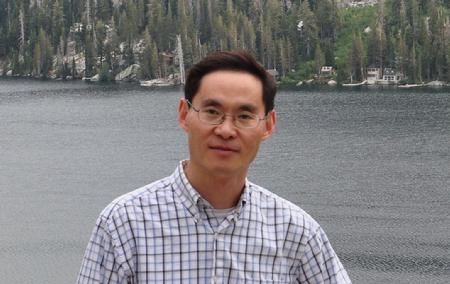Hao LI
haoli_at_genome.ucsf.edu
Professor, University of California at San Francisco;
Member, Center for Theoretical Biology, Peking University;
Associate Director, UCSF-PKU Joint Center of Excellence in Quantitative Biomedical Research.
| 
|
Education:
07/1985 BS Physics Peking University;
05/1987 MS Physics New York University;
06/1992 PhD Physics MIT.
Research interests:
1) Accurately reconstruct the cellular transcription networks using functional genomics and bioinformatics tools;
2) Study the dynamics of gene regulatory networks quantitatively at a systems level;
3) Derive principles governing the evolution of gene regulatory networks.
Academic Work experiences:
2007 – present,Chang Jiang Lecture Professor, Peking University;
2002-2005,Overseas Distinguished Chinese Scholar;
2001-2006,David and Lucile Packard Fellowship in Science and Engineering;
1997-1999,W. M. Keck Fellowship, Rockefeller University;
1985-1987,Graduate Fellowship, New York University.
Selected publications:
1. H. Li, R. Helling, C. Tang & N. Wingreen. Emergence of preferred structures in a simple model of protein folding. Science 273, 666 (1996).
2. H. Bussemaker, H. Li & E. Siggia. Building a dictionary for genomes: Identification of presumptive regulatory sites by statistical analysis. Proc. Natl. Acad. Sci. USA 97, 10096 (2000).
3. S. A. McCarroll, C. T. Murphy, S. Zou, S. D. Pletcher, C. S. Chin, Y. N. Jan, C. Kenyon, C. I. Bargmann, and H. Li . Comparing genomic expression patterns across species identifies shared transcriptional program in aging, Nature Genetics 36, 197 (2004).
4. B. Tuch, D. Galgoczy, A. Hernday, H. Li, and A. D. Johnson, The evolution of combinatorial gene regulation in fungi, PLoS Biology 2008 6(2):e38.
5. C. Chin, V. Chubukov, E. Jolly, J. DeRisi, H. Li (2008), Dynamics and design principles of a basic regulatory architecture controlling metabolic pathways, PLoS Biology 6(6): e146
Other Activities:
1. Made significant contributions to the fields of protein folding/design and genomics.
Published more than 50 scientific papers in professional journals including Science, Nature, Nature Genetics, PLoS Biology, PNAS etc;
2. PNAS work on building dictionaries for genomes was featured in a TV series called “Secrets of Sequences” by PBS in US;
3. Research supported with grants from NIH, Packard foundation, Sandler’s foundation. Recent received the highly competitive NIH director’s transformative R01 grant, covered by NIH press release and San Francisco Business times.